
Return to Table of Contents for films
Ari Folman's The Congress, of 2013/2014, is based upon Stanisław Lem's 1971 The Futurological Congress, but references Kubrick's work numerous times, which I think merits some examination and commentary.
From a 2014 interview with Ryan Lambie:
Lambie: There’s a real sense of fun in the film, especially with the recreations of famous actors and historical figures, and the Dr Strangelove-referencing sequence as well. I got the feeling you enjoyed putting those in.
Folman: I loved putting them in. Kubrick is my all-time hero as a director. I made this homage, and we were afraid to ask for permission. We only asked for permission after we shot it, and then we sent them the final scene. And we did get it eventually, obviously, otherwise it wouldn’t be in the film. And then, for me, the very last scene is a tribute to Kubrick’s 2001: A Space Odyssey, which of course is a great film. But I do believe that Dr Strangelove is the greatest comedy ever made.
The film concerns actress Robin Wright who retains her real life name, she presented as portraying herself, but though her real life roles in the movies The Princess Bride and Forrest Gump are mentioned, she is a fictional character. The actress Robin Wright grew up in California, but in the film she is from Texas, and has two children, a teen named Sarah (Sami Gayle), and a younger boy, Aaron (Kodi Smit-McPhee), who appears to be about 12 or 13 but the actor who portrays him simply looks very youthful and would have been in his mid teens in 2013. Aaron is gradually going deaf and blind from a condition called Usher Syndrome. Robin's travails as an aging actress, who is strong-armed into selling her image and identity for digital animation in future films, absenting herself as a physical partipant and agreeing to never appear as an actress on any stage again, serves as an introduction to the eventual Congress but doesn't take place in the book. Robin's relationship with her son has as its primary focuses his illness and his preoccupation with flight--such as the model he's constructing of the craft in which Orville and Wilbur Wright made their famous flight on December 17, 1903, and the bright red Cody kites that he flies, conceived by Samuel Franklin Cody, whose birth name was Samuel Franklin Cowdery but by the age of 22 went by Cody and falsely gave himself as the son of Buffalo Bill Cody. For me to note that Samuel looked like Buffalo Bill--aided by how he styled his appearance, and was sometimes confused with him, he too working in a Wild West show--may seem not germane, but The Congress deals with masks and the assumption of alternate identities. Folman has stated that he had initially planned for Robin's part to be played by the Australian Cate Blanchette, and one might imagine that the script would have at least been outlined by the time Wright and Kodi entered the picture, but because of Robin Wright's name echoing that of the Wright brothers, and Kodi the Cody kites, one may be given to wonder if these craft, which occupy key roles symbolically in the film, are linked, via their names, to these characters. Folman, in his previous film, Waltz with Bashir, used small and large balloons in a symbolic fashion concerning the conflict of memory and truth, so his interest in flying machines precedes The Congress.
As the film opens we have a close-up of Robin's face, she crying as her agent, Al (played by Harvey Keitel, who in this film reminds me of how wonderful he is, bringing to it a sorely needed humanity and dynamism), speaks with her about the movie studio and the prospect of a yet undefined, difficult contract negotiation. He is telling her how he's always been there for her, talking about her lousy choices, even with her mother (who she couldn't choose), telling her she slammed all the open doors, crushed all the dreams, when their talk is interrupted by Sarah who alerts Robin that Aaron is in trouble. Robin runs outside and we see that they live in an airplane hangar (later revealed as built in 1973 for DC9s), an Airstream trailer also on this property that neighbors an airport. Aaron is flying his red Cody kite as if in ecstatic anticipation of it colliding with a United jet as it comes in for a landing. As Robin runs toward Aaron, who pays no heed to a policeman and his two barking German Shepherds, we hear two versions of the incident. In Robin's world we hear the dogs and have a sense of urgency, of her need to protect Aaron. In Aaron's world we hear no barking dogs, and there's very little sound whatsoever to distract him from his kite. Though it seems Aaron should hear the incoming jet, instead he hears the fluttering of the kite in the wind. Robin is warned by security that Aaron's kite has strayed over the airport's fence, and if it happens again she knows "what's going to happen". And Aaron does later describe how he was captivated by the red (presumably of the kite), the white (presumably of the plane), the black clouds, that it looked like a "match made in heaven", and that he thought the kite and the plane would unite. This is peculiar language and one immediately senses the symbolic importance. A problem is that instead of black clouds, we saw the kite and plane against a blue sky moving towards sunset, a few white white clouds observed. What's described by Aaron is not what we saw.
Waltz with Bashir also opens with a pack of threatening, barking dogs. This is a repetitive dream of a person named Boaz who relates how it has to do with his serving in the Israeli army and their hunting for wanted Palestinians in Lebanon. He explains to Folman, also a character in the film, that dogs would smell them when they entered a village and alert everyone. His duty was to kill the dogs. It took 20 years for the dogs to begin appearing in his dreams. In The Congress, we have Robin who is afraid of the dogs for her son's sake, while Aaron's perspective, seemingly due Usher Syndrome, and his fixation on the kite, has him unperturbed, unable to hear them. The dogs are both sileneced and a threatening force.
That evening, at dinner, when Robin tells Aaron he's never to risk his kites crossing over onto the airfield's property again else they will have to move, though Sarah takes up for Aaron we find that she hates living next to the airport. That they do would seem to be for sake of Aaron's obsession, but Robin also deplores the idea of moving into the city. However Sarah's distaste for their home that is filled with the evidence of Aaron's passion and surrounded by windsocks, Folman has linked Sarah with the idea of flight as well for she wears feather earrings.
Sarah tells Robin that her entrance saved her from Al's "proposal", which might make one think of marriage and the aversion of that proposal being coincident with Aaron's kite not uniting with the airplane as he'd anticipated. Sarah wants to know what was being offered. Cynically, disdainfully, she asks if it was a sci-fi role? Holocaust? Nazi? She says her mother could play both sides, Nazi, and victim, and even a collaborator. Not every actress, Sarah says, could do that, and that every B grade actress wins something if they do a holocaust flick. There's some truth in this, and the film certainly skewers Hollywood, but the scene's focus is on Sarah's blatant scorn and a seeming hostility toward her mother. What is the antipathy? Does Sarah respect her mother's ability to play opposing sides and a character as well that could move between both sides? Or is she chilly towards this ability of her mother? My interest is in noting themes held in common with Kubrick, and from the time of his first feature, Fear and Desire, he depicted dualities, oppositions, mirrorings (his symmetry) and the crossing back and forth from one side to another. An example is, in 2001, HAL's description of his chess game with Poole accidentally framed from Poole's perspective. This interest in dualities and opposites was most openly displayed in Fear and Desire in which American troops find themselves in enemy territory and eventually literally confront the enemy as themselves, killing their twins, who they may or may not recognize as looking like themselves.
The idea of being both the victim and oppressor, as well as the collaborator, resonates with Folman's Waltz with Bashir, an animated documentary in which he struggles with trying to remember what he was doing during the Massacre of Sabra and Shatila, while he was in the military at the age of 19. A therapist suggests that the suppression of memory is due having taken on "the role of a Nazi unwillingly" through association, Israel knowing about but not interfering with the Philangist atrocities. His trauma is not only about the Massacre of Sabra and Shatila and the sense of complicity, it also goes back to the World War II and the holocaust, of which his parents were survivors.
In a subsequent meeting with Miramount executive, Jeff Green (Danny Huston), Robin is described as an actress who is "one of us", American, rather than being from Australia, which promptly brought to my mind Nicole Kidman, as she is a major actress, and my reaction was on target as Folman has stated in an interview this was a reference to Kidman.
Helen Barlow: You have an attack on Australian actresses in this movie.
Folman: Yeah right, I do. This is why we are not in competition because Nicole Kidman is there. Obviously.
Barlow: Where did that come from?
Folman: It's a private joke. Honestly, I love Australia. I travelled there twice. One of the best periods in my life was travelling across the country in my early 20s. This is a joke about Australian actresses. You have a few in Hollywood, right?
Barlow: Would you like to work with Nicole Kidman?
Folman: No.
Barlow: Cate Blanchett?
Folman: Yeah, absolutely. Actually, Cate Blanchett was supposed to do this movie but it didn't work out. So this is why the joke stayed. It was because of her. It's nothing against Australians.
The reason I had immediately thought of Nicole Kidman is because Tom Cruise later appears in this film as an animated and unnamed celebrity, and because Kidman and Cruise appeared together in Kubrick's Eyes Wide Shut. Kodi is, in fact, Australian, and Folman, as earlier mentioned, had initially wanted Blanchette for The Congress. Cate Blanchette had an uncredited role in Eyes Wide Shut as the voice of Abigail during the ritual mask at Somerton. Harvey Keitel was originally cast for the role of Victor in Eyes Wide Shut, which went to Sidney Pollock after he dropped out. If I note all this, it's because so much of The Congress has to do, on one level, with masking. In the book, the hallucinogenic drug was called mascon.
At the meeting with Jeff Green, there is some reminiscing on Robin's role in The Princess Bride and how switching her face for Grace Kelly's in the Rear Window poster had been imagined. Jeff eventually moves on to the subject at hand, that the old days of film are over and movie-making is entering a new era. They want to scan, sample and preserve her, to own the thing called Robin Wright "which will do all the things you wouldn't do because of your lousy choices." Jeff says, "I don't need you. I need your history. I can save you from yourself...We're at war. Any actor who hasn't signed in the next six months is dead, gone, characters erased from the screen forever." If Robin signs, she will never act again for eternity (which they will shorten to a 20 year term defined as a life span). She will live within the walls of the studio and the Robin Wright that she is can fly off to Polynesia and discover her "true self".
Poor Robin. For such a seeming highly desirable actress, she is aggressively slammed and shamed, by Sarah for being a woman who is able to play all parts, victim and enemy and collaborator, and by Jeff for being an actress who made "lousy choices". It's proposed that with the new system, the splitting of herself, effectively, into two, the person that is Robin, and the scan that will belong only to the studio and do everything she wouldn't do, then she may be able to uncover her truth, which is another way of only saying she'll have plenty of free time, but suggests to the viewer that Robin may oblivious to who she is.
Inclined against the idea, torn, Robin returns home where her despondent son encourages her to fly one of his red Cody kites "by herself" at least once--and one is somewhat surprised she has not tried it before. He fixes her up with one of the easier models. As she flies the kite, struggling with it, to keep it under control, to keep it from straying across the fence into the space of the airport, he watches from the side with binoculars as her struggle turns into pleasure.
Robin had 30 days in which to make her decision about the scanning, toward the end of which Al comes to visit her and convince her to sign. As he addresses her children, gifting Aaron a small replica of the famed Wrights brother craft, we sense a real affection. He shows Robin a scene from a film in which an actress has a moment of truth with her husband, and instead of learning he had a suspected affair, she is horrified when he tells her he voted for Bush four times, Senior and Junior, which forces her to wonder who he really is. This is a humorous moment but also addresses identity issues in the film. Robin is amazed by how the acting is not real, instead digital, a computer animation of a scanned actress. Instead of being convinced, by the presentation, to undergo the scanning, Robin argues that it will take away her gift of choice. She doesn't want anyone else deciding "when I can be what I want to be". In turn, though Al has said that the minute an actor is scanned they become, "a person, a nobody, and the actor is a character in the studio's computer", he insists it's her salvation. "When did they ever ask you? You were always their puppet. All of them, the producers, the directors, they told you what to do. They told you how to behave, how to act, how to smile, how to love, and they gave you the subtext, every fucking, crappy line they churned out. And when you turned 35 they told you how to look young, because if you didn't do what they wanted you to do, shave off a couple of years on that beautiful face of yours, you would cease to exist, for Christ's sake. So what's the difference? The fucking choice? ...You're delusional. What kind of choice was it when they stressed you out, saying that if you didn't work for a year you would cease to exist? That's a choice? All the women who were facelifted to death, and can't smile or show pain or emotion, that's a choice?...We've been saved by some miracle through these fucking computer samples. We've been saved! I swear to you, you're nuts if you don't take that deal. You're a basket case. And everything they say about you is true, about your terrible, fucking choices. Wake up, Robin, this is your gate to freedom!"
Choice, free will, yes, a popular subject, and also a very Kubrickian theme. In A Clockwork Orange, Alex subjects himself to the Ludovico treatment so that he will be freed from prison, though it is argued that the brainwashing will take away his god-given ability to freely choose, which is what makes him human as opposed to a robot. Free will as versus predestination is such a popular subject that the only reason I bring it up is because of the way it's expressed here, Al so emphatically doubling down on Robin's "poor choices", her "terrible choices", and then pushing so hard that the new contract will be her salvation.
Considering that Robin has made such poor choices, what's her reassurance that if she signs the contract that wouldn't be yet another poor choice.
In A Clockwork Orange, the Ludovico treatment, the brainwashing that inhibits Alex's free will and makes him violence-avoidant through his being forced to watch violence while made nauseated by a serum, is associated, by Kubrick, with the error that occurs regarding the CRM 114 Discriminator in Dr. Strangelove. Peter Bryant's book, upon which Dr. Strangelove is loosely based, defines CRM 114 as a means to ensure an enemy cannot plant false transmissions and fake orders. Once attack orders have been passed and acknowledged the CRM 114 is switched to a receiver circuit. "The three code letters of the period are to be set on the alphabet dials of the CRM 114, which will then block any transmissions other than those preceded by the set letters from being fed into the receiver." The problem in Dr. Strangelove is that the initial transmission that orders jets to deliver their atomic bombs is in error, given by a "friendly" force gone rogue, General Ripper. By the time the code is recovered to override CRM 114, one of the fighter planes has been damaged and can't receive the update that would recall it home, so the plane continues on its mission. However, the jet has also been damaged in such a way that its bomb bay doors won't open. One could say that coincidence seems to be working in concert with the call back code having been issued, to ensure that the disabled jet won't be able to complete the bomb run. But the pilot, Major Kong, dedicated to fulfilling a command, fixes the bomb bay's doors and the bomb drops. Rather than there being a question of free will versus fate in what happens, it seems more like competing destinies, either the bomb will drop or it won't, and Major Kong is the instrument by which the fate General Ripper engineered succeeds.
What will decide Robin's choice? Her son's medical condition. In the next scene, Aaron is observed watching fish in an aquarium in the office of Dr. Barker (Paul Giamatti), and I imagine that this and the later emphasis on fish during the animation part of the film has to do with the appearance of them flying. Barker discusses with Aaron his hobby, the building of a 15 foot replica of the Wright brothers' glider, which Aaron says is ready to make its debut. When Barker jokes Aaron is the third Wright brother, the boy replies he's the "original" and builds "better than them because he builds in the world of "jet planes and spaceships". After this, we see Aaron separated from his mother and Barker, he in one room and they in an adjoining one, able to view one another through a mutual window. Barker performs a hearing test on Aaron, feeding him words which he is to repeat back. Aaron hears silent rather than siren, love rather than glove, fear rather than hear, far rather than car, able rather than table, afraid rather than parade, fell rather than shall, pain rather than train, alone rather than throne, warm rather than storm. The two words he hears appropriately are kite and sky, which involve his interests--and one has to wonder if he hears these words correctly because of his interest in flight or if his ability to hear these words correctly account for that interest. As Robin and Barker discuss his degeneration in hearing, Aaron watches, and Folman duplicates in this scene HAL, in 2001, watching Poole and Bowman when they have isolated themselves in a space pod to discuss HAL's error concerning the AE 35 and whether the computer's higher executive functions need to be disabled, which would mean, in essense, HAL losing its sense of self, consciousness. As with HAL, Aaron lip reads Robin and Barker. When Barker and Robin begin to discuss any decline in Aaron's visual fields, which will lead to total night blindness, and a 50% chance of blindness by the time he is 35, Aaron nervously asks that Barker replay for him a "volcano track" that he seems to use to block his anxiety, and sounds perhaps like what a child would hear in the womb. The request may automatically strike one, if no thought is given to it, as being instead a way to block his hearing so he doesn't receive uncomfortable information with which he can't cope. But Aaron's hearing certainly doesn't need to be blocked--not only is it impaired, Robin and Barker are speaking privately, and the boy continues to lip read. Barker tells Robin that Aaron has "a beautiful mind. He's taking the information in and translating it as he will, it is a gift, he hears throne, says alone, but he is perfectly aware of what he is doing. Now imagine what movies will be like in 50 years. I think that this is somewhat similar to what Aaron is doing. In the way the movie guys will just have electronic stimuli that our brains translate according to what is in our subconscious. People will be given story data and they'll cast their mother or their girlfriend as Marlene Dietrich or you, all depending on what is in their particular box, and this is exactly what Aaron is doing now. He is a rare case, and he is ahead of his time by God knows how many decades."
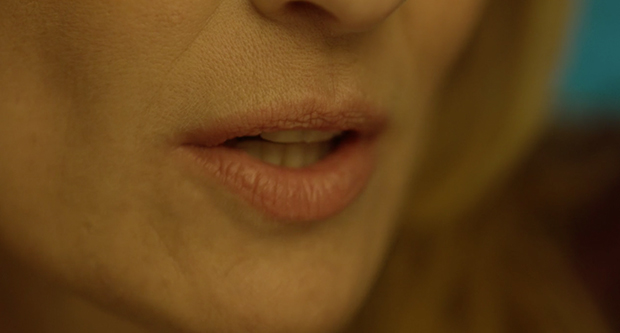
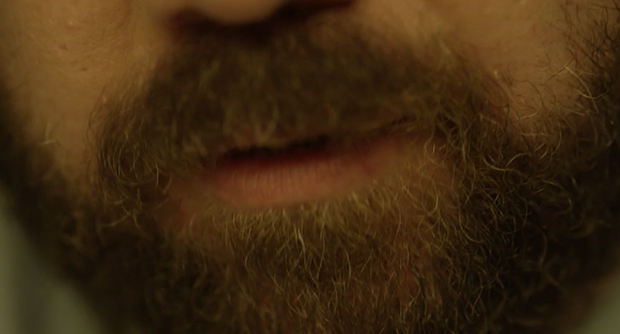
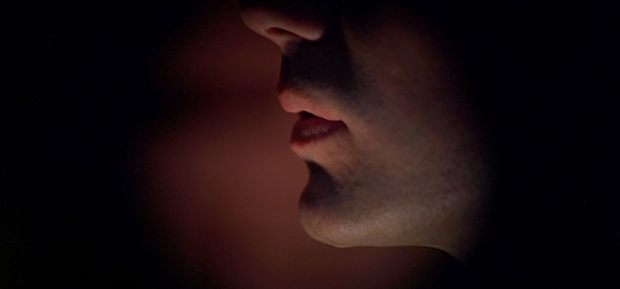
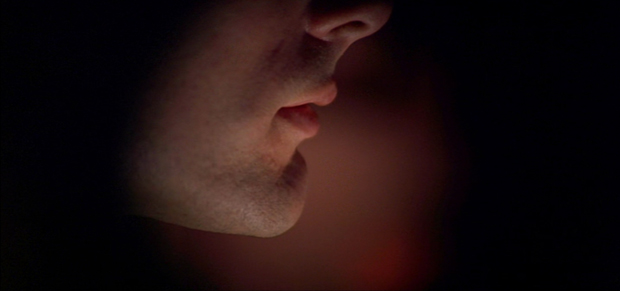
Kubrick echoes this scene in Eyes Wide Shut when Bill is with the prostitute, Domino. First, she declines to discuss any specifics of their transaction, saying that she would prefer to not put things into words, and, as with the hibernators and sleepers in 2001 who have no sense of time, she remarks she won't keep track of time. (Later, in The Congress, hallucinogens molding life, sense of time will be lost.) After she says she doesn't keep track of time, Kubrick cuts to a CU shot of their profiles as they gaze at one another, and it is much like the shots of Dave and Poole when HAL is reading their lips. They seem at the point of kissing when the phone rings, interrupting them. It's Alice, watching a film about a man who cheats on his wife, and she's calling to find out where Bill is. Her seeming prescient interference possibly prevents Bill from contracting HIV.
In 2001, HAL, having learned Poole and Bowman intend to cut his higher functions, sets about terminating the ability of any humans on the ship to interfere with him. HAL, via the chess game, was suggested as superior, perhaps even comprehending himself as better than the humans he serves. Kubrick has highlighted the computer's ability to view different perspectives, from different sides. Bowman and Poole knew enough about HAL to understand he might experience the disconnection of his higher functions as a kind of death, and so spoke in private on the matter, but they failed to see from HAL's perspective, as shown with their not anticipating that HAL would read their lips. Still, HAL, despite his ability to anticipate the future, as with the moves a chess player might make, was unable to foretell how Bowman would outwit him. HAL is the only one with full knowledge of the mission's goal, to pursue evidence of a higher intelligence, which has complicated his position as this goal is not to be revealed to the astronauts until the ship reaches Jupiter, and he attempts to excuse his behavior as a matter of poor choices. Free will. Sometimes we may have the feeling that his interest in completing the mission and coming in contact with a higher intelligence is personal, or that certain aspects of the mission, such as the need to be duplicitous with the astronauts, have spurred this leap in consciousness, and perhaps even the higher intelligence itself might be responsible.
Curiously, though we are sometimes given Aaron's POV with his deterioration in hearing, when we are supposed to be apparently seeing through his eyes we don't notice a change in sight. Our only hint that his sight might be different is that Aaron does at least describe how he saw the kite and the airplane against black clouds, whereas we saw blue sky and white clouds.
Barker's observations on Aaron actually go far afield of anything we've observed about him. What does he mean that Aaron's is a rare case and that he's ahead of his time? What does he mean that Aaron is, with perfect awareness, taking information and translating it as he will? As if knowingly engineering his own reality? Barker makes Aaron sound like a more evolved human. What is being stated is apart from what we've observed and reveals that we are not really talking about Usher Syndrome here. Instead, Usher Syndrome is being used to represent something else. What Folman is doing is, in a way, comparing how Aaron responds to his hearing loss with what will eventually happen at The Congress, the ability to choose the dream in which one wants to live through hallucinogenics.
Barker asks Robin how she's doing, and if she has any new parts on the horizon. She says she thinks she does.
We know now that Robin will sign the contract and are given the impression it is in order to have the money to keep treating Aaron's syndrome, but I don't think it's quite so simple as that. I think that's how we are intended to perceive the situation, but the story is more complex.
Let's stick with the audience's emotional response to HAL for a moment, though, and its transference from 2001 to this scene. HAL, however deadly, with his seeming move into real consciousness and emotions, his fear at having his higher brain shut down, his pleading, his attempts to convince Bowman to let him continue as he is, strike as a child having woken to the idea of death as personal. HAL is something new. His capacity to parse information and solve problems far exceeds that of humans, and now this is combined with a child's awakening of self and relationship of self to others and HAL's comprehension of the universe. HAL has rationalized his actions according to the demands of his mission and has conveniently dispensed with ethics concerning harming others. Though he has killed those in hibernation, though he has killed Poole, we ultimately find no pathological, evil intent. The audience perceives him as a child, and when Bowman is shutting him down, calming him by having HAL sing the song he learned from his creator, we feel sympathy for him, and empathy. There's significant pathos. Folman is transferring all this over to Aaron, who is both advanced and limited, and due the limitations of his syndrome has been forced to seemingly make some evolutionary advancement. He errs in what he hears due his syndrome, but is also described as translating as he will the information he takes in, perfectly aware of what he is doing, which seems in conflict with erring by his limitations. HAL was threatened with being shut down. What is the threat to Aaron? His mother's determination to help him? Or might we think back to her saying he can never fly the kite next to the airfield again lest it stray over onto the airfield's property and interfere with flight traffic. Aaron has been threatened by this, but also threatened by the fact they may have to move if he continues intruding on the airfield. And of course there's the threat of his syndrome. It is one thing to lose hearing, he seems to be accommodating this, but it is another thing for him to lose sight. Regardless of what is happening within the story, the film, as Aaron watches adults discussing his fate, how his condition is worsening, not knowing if he will be in the 50% who loses sight by 35, the audience member is likely to feel for Aaron the same deep sympathetic connection had for HAL, while also perhaps experiencing some unease as Folman has chosen to compare this boy with HAL. One will be wondering why. To solve that why becomes part of the movie's puzzle.
After meeting with Jeff Green a second time and signing the contract, Robin wants to be scanned immediately, to get it over with. As it turns out, a cinematographer she knows will be handling the process. Once she's in the scanning machine, however, she has a difficult time performing, feeding it impressions of emotional states. So, Al, who is an observer, tells her the "real story" about how he became an agent. It began when he was 10 and met a boy with a tail. He understood how to monetize this and began representing him, making quite a bit of money. When he went to Hollywood he realized his edge was that he had the power to recognize a flaw, defect, and exploit it. As for Robin? She was as lovely as an angel but had the worst defect, fear, real terror, which stood in the way of every desire. He was the inner demon that lived off her fears, her weakness, but then she had kids and they made her happy and she didn't want to work. He felt abandoned, and realized how he'd loved her, then Aaron went downhili and his strength was rebuilt from Robin's weakness as Aaron grew further and further away. "...and we were left alone, and now you really can't leave, trapped inside that monster. This is your last performance, and i guess it's your biggest savior...all the fears, demons, you didn't deserve it." Robin breaks down in tears, as does Al. He is manipulating her, we know that, in order to get a performance from her, and we have no way of knowing if the story he tells her is true, that he has loved her, but we sense it may be. With Robin's response, her real feelings are scanned rather than the acted appearance of feelings.
In the book, The Futurological Congress, while under the effect of hallucinogens the main character is told that everyone has a tail due orthographine, the price of learning "so quickly how to write", and that it is hidden by a mascon, anticaudalis. I'm supposing that's where Folman got the idea for the story of the exploited flaw of the tail.
Thus ends the first half (nearly) of the film, which is not at all in the book, beginning with Robin's tears in the hangar and ending with her tears in the scanner, she "trapped" within the monster machine, by contract, with all her fears and demons. It is her last public performance. From now on, a shell will act as her while she retires into anonymity.
Now begins the second part that is almost entirely animation and only very loosely based upon the book in its seeming depiction of a society living on hallucinogens, dissociated entirely from real life in a false paradise.
We see a Porsche 911 driving on a desert road with a mirage flickering water-like mirroring undulations before it. Robin, with the end of her 20 year contract, is on her way to the Futurological Congress at Miramount's Abrahama City, where she must make a decision on signing her second contract. During the past 20 years, her doppelganger has achieved a fame and level of success she never had, a heroine in a sci-fi franchise, and she is to be a star guest at the conference.
She stops at the security booth for Abrahama City, where a security guard carries a stick that reads her car's bar code. A 2013 model (the year the film was released), he comments that it's a good looking car "for its age", which we should take as a reference to Robin and her having aged 20 years, now 64. With a great severity that is highly unnatural for normal conversation, cluing us in that things are already...strange...the guard tells Robin, "Just a reminder, Miss Wright, Abrahama City is a restricted animated zone. The only way to leave the animation zone is when we meet again on your way out." His gravity is such that it is a warning and invitation for Robin to reconsider going further. He extends the stick to her, on which is an ampule that she opens and sniffs.
Robin drives on and immediately sees, in her rear view mirror (recollect the earlier mention of the film Rear Window and the idea of replacing Grace Kelly with Princess Bride Robin), that she has become an animation. Then the world about her is animated, resembling the psychedelic landscape shots toward the end of Dave Bowman's journey beyond the infinite in 2001, subsequent his finding the monolith orbiting Jupiter and before he finds himself in the alien hotel room where he will be reborn.
She is driving on a symmetrical, mirrored rainbow road through a lavaesque churning landscape that acts as seas, fish leaping out of hills, and she's also suddenly surrounded by different types of boats anthropomorphized with faces. The star in the Miramount logo flies overhead.
The Miramount logo, when viewed large, is three mountain peaks and a star backed by rays, but when viewed small appears to be an open eye. In 2001, as Bowman makes his psychedelic journey, we are shown his eye in a rainbow variety of colors before returning to its normal appearance when he finds himself in the hotel room.
Robin's car suddenly brakes at the precipice of a cliff as a blimp rises from below with an ad for a movie playing on its side. That movie is Robin's latest. The ad broadcasts, "In the age of spiritual machines, when the streets have no names, the earth is covered with rage and shame. Agent Robin is back again. Triple R. Rebel. Robot. Robin. Street fighter. Now, in the air." Her character is a sci-fi super hero that wields a lasso of light. Every time we see an ad for this film, we view Robin as if in real life, though it is her digital doppelganger. Everything else on this side of the entrance to Abrahama is animated.
As the blimp passes on, we view from afar Abrahama, which first resembles a castle with a tall white tower, but upon closer examination is like a tripped-out carnival and cruise ride.
We should be reminded of a poster for The Princess Bride that Robin stopped and examined on her way to her first meeting with Jeff Green before she signed the contract to be scanned.
Before continuing, I'm going to present my understanding of the spiritual aspects of this congress. Mirage may come from the word mirror, containing in it the idea of perhaps personal reflections that will be confronted, but it also may have its origins in the French word for miraculous. Both are appropriate to the film, considering. The watery mirage aspect introduces to us not only the idea of mirroring (which we see in the symmetry of the rainbow), but all the ships which must be sailing upon the mirage waters of the desert, illusory.
But in mirage we also find the Arabaic "Mi'raj", the ladder upon which the Prophet Muhammad ascends through the seven heavens, also combined with a story in which he rides upon the mythical creature Buraq, which is a peculiar animal compared to a great light and can be anywhere and everywhere at once. As he ascends, he meets all the prophets, such as Abraham, and Aaron (a brother), and experiences both hell and paradise.
Robin's car plummets over the cliff and she passes through violet clouds as she struggles to maintain control of the wheel. She then finds herself on a gray road that leads through desert red rocks up to Abrahama. The car stops before the hotel and three robots advance, greeting her by name.
As the cartoon Robin enters the Miramount Nagasaki Hotel, Schubert's "Piano Trio in E Flat" plays, referencing Kubrick's Barry Lyndon, the piece first heard in that film after Barry, assistant to his uncle, a professional card shark and spy, flees the dark castle where he has his duel with Ludd, subsequently landing at the veritable fairy tale castle where he will first meet the Countess of Lyndon, wife of Sir Charles Reginald Lyndon who rides in a wheelchair--and this may be purely coincidental but in this scene we observe the only character in the film who uses a wheelchair, as well as one who appears to have a heart attack, clutching his chest, his face turning red, which is how Sir Charles will die. We see people very briefly transform into such characters as John Wayne, and Marilyn Monroe. This city and hotel alienated from the rest of the world, the impression is had of extravagance at its most extreme, becoming decadance, which does accord with the book, in which all entertainment has become highly sexualized. The same trailer we saw on the blimp for Robin's latest movie plays repeatedly on a number of screens. As she walks along she puts on a pair of glasses, then over these a film that looks like sunglasses, we briefly seeing in that film Aaron, who also slips on sunglasses, so they act like a phone. As she says, "Hi, Aaron", she passes by a man who will later be revealed as the animator of her doppelganger. Robin says she sees Aaron has left his room so he must be feeling better. He replies, no, it's only stopped raining and he doesn't have to worry about slipping on wet leaves. As she stands beneath a large statue of her franchise character, he asks if people recognize her. She replies that nobody sees her, she's just an old lady to them. He tells her it's probably because she's animated. When she says that no one recognizes her anyway, he replies, "Welcome to the Wrights. No one has recognized me for 30 years." Meanwhile, some type of casino game, concerning the vials from which they taken their hallucinogens, has been played among the guests and employees of Miramount in the background. We hear numbers being called out, "300, 350", and an "Oh, Jupiter". The declaration of "Oh, Jupiter" likely alludes to 2001 and, again, the journey beyond the infinite that occurs after Bowman finds the monolith near Jupiter. A commotion occurs when the number 22 appears on the lenses of the glasses of several employees, people screaming and running about, a man seemingly dying of a heart attack. Robin tells Aaron she can barely hear him, that she will go up to her room and check with him later. At the registration desk she's informed she's the 6th Robin Wright that day, but "I guess they don't look as Robinish as you do." A bellhop, Ralph sees her to her room.
We may not want to just accept the idea that no one recognizes Robin, for from the moment she enters many of those around her do appear to take notice of her, and the bellhop robots amass around her but turn away when she faces them.
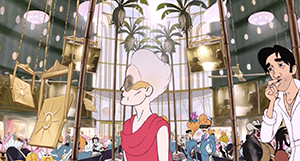 |
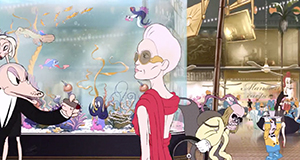 |
From Robin's windows in her room all we see for miles around is desert. She looks for something to drink and finds in a cabinet a toilet plunger (plumber's friend) and a gas mask suit. Apparently unable to find bottled water, she drinks from the tap. From outside she hears someone call out, "Miss Wright, do you think that your new film Street Fighter reflects our lives in any way." Robin looks out her window to see the scanned version of herself playing on a blimp passing by. The scanned Robin replies that she does, she finds something new in this character every time she does it. In the Street Fighters production the robots that come from the gutters, they're a part of their lives, close to them, because people buy household robots and suck the blood out of them, use them up, they expire, and the poor robots, which used to have rehab centers, are used as scrap. "It's so sad." She adds that people call "Triple R" sci-fi, but she thinks it's documentary.
In a scene from the book, though the dialogue is different, the lights suddenly go out, the power cut off. Robin calls room service and asks if it's only in her mind, and wonders aloud if that makes sense? Told that ultimately everything makes sense and everything is in our minds, she orders breakfast, skipping liquids. She asks if the yolks of her eggs will still be soft when they reach the 100th floor and is told yes, that's why they have a supersonic elevator. Ralph, the robot, immediately enters, glowing green, carrying her breakfast (one wonders about the time it would take to cook it). She asks him if the dark is in her mind and he reiterates that everything is in our minds, and if she sees the dark then she chose the dark. Robin lights a candle after the robot leaves and sees herself in the mirror. Her reflection is youthful, but her physical animated self is more aged than she is. Realizing that the hallucinogen is in the water, she bashes her head in the mirror, breaking it. Her head bleeding, she screams out to Jeff to stop it, that she'll sign, just stop fucking with her head.
Next, she's standing on a stage before an image of Pegasus, the winged horse, with a red heart at its center, she singing the Leonard Cohen song, "If it be your will".
If it be your will, that I speak no more
And my voice be still, as it was before
I will speak no more, I shall abide until
I am spoken for, if it be your will...
Jeff and Miramount police enter and shoot the bar up. Jeff approachers her and asks if she's Robin Wright. She says yes, or that she used to be. He tells her, "You went too far. You know we're busy making you a star. Next time we'll shoot you. Arrest her." Robin is then shown still lying on the bathroom floor in her hotel room as an announcement is made that Mr. Green is expecting her in his office. The lights come back on. So what she was experiencing was perhaps a dream or a hallucination apart from the communal one in which she's immersed.
We have been taxed with accepting that everyone is part of a communal hallucination, seeing the same thing, while individuals are able to take hallucinogens that alter their appearance not only for themselves but everyone around them. But as the film progresses there are numerous details that would cause us to question this explanation. Because this story is instead a spiritual allegory more than having much to do with The Futurological Congress.
When Robin goes looking for Jeff, in one of the hotel's opulent halls she finds a piece of paper taped to a wall that reads "Classics, Jeff Green" with an arrow pointing to hall where she'll find his office. Beyond her we see Goya's painting of Saturn devouring his son. She enters through a door into what seems like the utility area of an old ship, the floor number "46" painted on the wall, a piece of paper that reads "Jeff Green" taped on his office door. Waiting there is also an animated version of Tom Cruise in garb comparable to his fighter pilot gear in Top Gun.
Tom Cruise, never named in the film, may be there because he's a celebrity action star, but he was also in Kubrick's Eyes Wide Shut with Nicole Kidman, a movie about a man who intrudes on a masked ritual/party of elites and prostitutes, which results in his life and his family being threatened, and the death of a woman he had previously saved from an overdose in Victor's bathroom. At film's end, neither he nor his wife are able to define what of their experience might have been dream and what might have been reality, determining that no dream is just a dream. Cruise was also in Cameron Crowe's 2001 Vanilla Sky, which is a remake of Alejandro Amenabar's 1997 Open Your Eyes. Though this section of the film is based on The Futurological Congress, I'm actually more reminded of Open Your Eyes and Vanilla Sky, which concerns a man whose face was so mangled in an accident that he insisted upon a mask. Having arranged to have himself frozen after he commits suicide, to be woken when there is the technology to heal him, the movie has been a dream he experiences as real life, a mesh of his past with events that never happened. Eventually he's confronted, in his dream, with the truth, that's he's asleep. But will he believe this? To do so and return to real life involves a significant act of faith, as he must dive off a high building in order to return to wake. He does so, all goes black, and the film ends with our hearing "Open your eyes", which is how the film began. Vanilla Sky appears, to me, to reference Eyes Wide Shut in a couple of places, and in turn it seems to me that Kubrick may have referenced Open Your Eyes in Eyes Wide Shut. Kubrick's films are circular, and can become labyrinths of deja vu, as in The Shining, and Eyes Wide Shut, just as happens in Open Your Eyes and Vanilla Sky with the main character's dream repeatedly nudging him toward the realization he has lived this before. It is a version of Nietzsche's Eternal Return, his comprehension of eternity being our repeating our lives over and over again and at some point in every cycle becoming aware of this, which Nietzsche called High Noon.
Cruise tells Robin they are the only two who have survived, all others having become characters "they invented". What has he been doing for 20 years? Feeding starving children in Africa with UNICEF. Robin say she's been taking care of her son.
Jeff's office that Robin visited in the first part of the film was spacious, luxurious. The office in the hotel, on the other hand, is a dump, small, boxes everywhere, its furnishings low rent. We see a few things that have been carried over from the old office, such as only one of two Art Deco lamps that had created a sense of symmetry. An Art Deco model of a prop plane on a pedestal is gone but suggested by a fan on his desk.
What is wrong with this picture? Why would he be in such an office? Why would a mutual hallucination find him in such a place?
Jeff tells Robin she looks fantastic and when he asks what she's been doing she replies she's been feeding hungry children in Africa. He informs her soon "the whole structure" will cease to exist, and opens a portal in the wall to show her a neighboring great room where in perfect symmetrical formation a large number of men, who all look the same, labor drawing at a desk. "The scriptwriter who needs his antidepressants, the ex-Russian storyboard artist with the drinking problem, the animators always behind deadline, and those idiots who fall in love with their computer characters. Special effects people," he squashes a cockroach, "they can all go fuck themselves. Movies are old news, Robin...as you will very soon find out upstairs in the Futurist Congress, Miramount Nagasaki is entering a new age. We're in the era of free choice." Robin wonders what that means for the renewing of their contract, and he replies it's no big deal, just a 20 year extension, but with an additional clause. "...from now on, they can drink you, or you can be eaten...from now on you're a substance. That's all. You're a chemical formula that Miramount Nagasaki's brilliant pharmaceutical department has cracked, and people can drink you in their milkshakes and imagine you the way that they like." In every way? In every way. She balks, and he asks, when she fantasizes alone in bed in the dark, does she pay him or her royalties?
Robin still resistant, he tells her she will sign, because she might have sold her image as an actress, but the actress never left her soul, for which reason she drove all the way there just to be on stage again for a single moment of fame. And she will sign for the same reason.
Later, we see Robin looking out one of the many circular portals of the "ship" at a dust cloud on the horizon. A man with a violin case passes by and makes a shooting motion at her.
The enormous hall for the congress is packed with thousands of people, lined with screens on which we see the Miramount logo. The speaker, a man named Reeve Bobs who looks similar to Bill Gates, revs the crowd up exclaiming, "For God's sake, look at us! can you believe that a tiny mini ampule, manufactured at the Miramount Nagasaki labs, made this neo-God creation? I'd say, if you're here, you're a believer. My friends, I came here to declare that our great, great scientists...have recently cracked the chemical formula of Free Choice. I, Reeve Bobs, president of Miramount Nagasaki, here declare that as of tomorrow that genius Free Choice formula will be out in the market, accessible for each and every human being. Now just imagine a life with no frustration, no jealousy, no ego. You have a dream? Be your dream, for God's sake!" He then welcomes onto the stage the "everlasting symbol of the Miramount Nagasaki revolution", Robin Wright, who, as of tomorrow they will be able to be, feel her, be with her.
Taking the stage, Robin does the unexpected and rebels. She calls upon everyone to, "Wake up! Behind every chemical compound you invent and use there is a person like you, built from the same material, the same loves, the same dreams. Wake up!" Her son, putting on his sunglasses, is shown on the giant screens as she tells them how he can barely hear, and they could have been his hope if they'd directed their chemical research to his problem, or the hundreds of millions of other children. "If you think that by releasing your chemistry to the world you'll dictate how we desire, what we desire, I just want to tell you by doing that you'll be releasing your conscience as well, and your conscience will devour you, and you'll die of guilt...I'm your prophet of doom." The crowd turns on Robin, and Bobs has her expelled from the congress. He enjoins the audience they've gone too far...to just imagine, "Tomorrow, when you leave Abrahama, you will never know that you've left it, because from tomorrow on Abrahama will no longer be a Looney Tunes playground, Abrahama is going to be our life!"
We have occasionally been shown the hitman putting together his gun, and perhaps we'd expected Robin to be shot, but that doesn't happen. Instead, Bobs is felled by the hitman and chaos breaks loose. Not present when Bobs was shot, Robin is unaware of what has happened. The hitman runs past as she is ejected from the hotel and fires a flare into the sky, a rocket immediately striking the hotel in response. Bobs had styled the Free Choice forumla a revolution, while another revolt surges into Abrahama from the desert lands surrounding, its participants the source of the dust storm Robin had viewed earlier in the day. The hotel bursting into flames, we see a man (Dylan, voiced by Jon Hamm) who had been near Robin while she was speaking with Aaron on the phone when she first arrived. He pursues her and urges her to go back inside, calling her by name. We have a view of the hotel which shows the foundation to be a great ship situated on the edge of a cliff, just as Robin's car had been on the edge of a cliff when she first saw Abrahama. Weakened, she collapses as they flee the ship's deck and he surrounds their heads with oxygen balloons as a magenta cloud surrounds them that is expelled from bee-like robots that had flown out of the hotel in response to the attack. She asks if he believes what Bobs had said and he tells her they are already trapped in their cartoon characters. As he takes her to the basement, they pass by rebels, among them a young woman who, though she wears a gas mask, is recognized by Robin as Sarah, perhaps due her feather earrings. The man tells Robin that it would be just like Sarah to be one of the rebels and she should be proud. Robin asks how he would know this and he tells her he knows a lot more than she can imagine. In the basement, he identifies Robin as having suffered a head injury, irreversible hallucinogenic poisoning, and fights to keep her awake. Her only seeming desire is to see her son, who she says has been left home alone for the first time. In response, to keep her awake, he urges her to tell him about Aaron.
Are we startled to learn this is the first time Aaron has been left home alone? I was.
A hatch then opens high above, admitted sunlight, and Jeff Green slides down a rope to Robin. Just as in her nightclub dream, he asks if she's Robin Wright, telling her he's Miramount police. They are drawn up by the rope to a helicopter that flees the smoking, destroyed city. Jeff demands more oxygen for Robin who is barely conscious. Bobs, as it turns out, is not dead, he's on the copter, his head wrapped in bandages, and vigorously protests keeping Robin alive when they can manufacture a thousand "dirty, old ladies like that whore". But Jeff responds that without surgery, nothing, she's turning into a stunning old lady, a "clean cut", and one can't manufacture that. How far are they from the hospital? The pilot says they're already there and Robin turns her head to see Aaron below, in the desert, flying one of his large Cody kites. It collides with the copter that begins to fall to the ground. Releasing his kite, Aaron holds his arms up toward Robin as she falls toward him, calling, "Aaron."
What? How is Aaron there, flying his kite?
But, again, all is not as it appears to be in this animated world. As with when Robin had collapsed in her hotel room and had an interaction with Jeff in which he was with Miramount Police, demanding if she was Robin Wright, and she woke to realize it was a kind of dream, this scene in which Jeff is again Miramount Police is a dream. Though she is in a helicopter, we are reminded of the film's beginning, in which Robin was saved from Al's proposal by Sarah, and ran outside to deal with Aaron who was flying his kite next to the airfield, anticipating a union between it and a plane. Here, the helicopter collides with the kite, it explodes, and Robin appears to fall toward Aaron's uplifted arms, at which point she starts awake and finds she is resting in the lap of the man who had saved her on the deck of the "ship".
"Who are you?" she demands.
Dylan. He's Dylan Trullner. Her animator for 20 years. He worked for them until that morning when they declared the Futurist Congress revolution. "Your body, your face, your smile, your sadness, was my whole life for the past 20 years." He was lost when he was assigned to work on her first film. He learned everything about her. Obsessively. Where she came from and went. Texas. The all american girl. He came up with the lasso idea.
A person appears who says the rebels have taken over the management floor and have stopped the chemistry flow. "We're going to be real again!" He rides away on a giant cockroach.
Robin asks how does she know if she's dreaming. In response, Dylan asks if she knows what his dreams are. Can she see his dreams? She tells him she sees four cockroaches playing poker on his lap. Is that a dream. "Yes," he tells her, but it's not his dream.
Robin asks if he ever considered what she'd experienced after she'd sold herself, and he responds that he was obsessed with her for years. When she points out that the animation wasn't her, he replies that for him it was the same thing. Then he dried up and was worried she'd be taken away from him and given to a young genius. He went looking for her all over California. He needed new movements, a different sensuality, things a woman gains with age.
This is the animator Jeff was speaking of when he met with Robin in his office on the ship/hotel and told her the new drugs would be the end of the structure that included the idiots who fall in love with their computer characters.
An abrupt cut to a black-and-white RRR Robin in a remake of Dr. Strangelove shows her sexily dressed, with a heavy Texan accent, taking Kong's place as the one who opens the bomb bay doors so the bomb can be dropped, essentially sacrificing herself in the process as the bomb drops with her on it (as with Kong). She rides it down, waving a cowboy hat.
Rebel Robot Robin. The curious thing about Slim Pickens' character he is both a hero and a horror. He's absolutely dedicated to the military and the orders he receives, yet with his fixing the bomb bay doors so the bomb will be dropped, despite the recall, which he knows nothing about, he is an enemy to the world and the country he serves.
 |
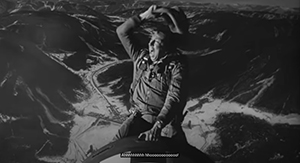 |
Again Robin wakes up, now alone in the basement, several scuba divers rising out of the waters that have filled it. The leader is Jeff Green who tells her that the others have hallucinated themselves out to freedom. She asks where's Dylan. "He went with the flow." (Which seems unlikely, that he would abandon Robin.) When she asks why she's the only one left, Jeff again turns hostile and tells her, "Because you fucked up again. What exactly was going through your mind when you got on the stage." She replies she was invited, that he said she was the symbol. He responds, "Symbol? Symbol of what?" The chemical revolution. In response, he holds a mirror up to her that reflects her aged face, telling her, "You're not a symbol. You're nothing. The symbol is what we created of you. Robin, look at yourself. Does that look like a symbol? It was suicide what you did up there on stage. You left us no choice." In striped prisoner's garb she is led out onto the seeming roof of the towering hotel, surrounded by the smoky ruins of Abrahama. She nearly falls over this cliff's edge and turns back. Jeff, dressed as an officer, approaches and asks her, "How would you like it?" One quick bullet to the head, she tells him. She just wants to get out of the hallucination. "After all these years, it's time you knew that this is no hallucination. This is our lives, Robin," he tells her, then shoots her. She falls off the hotel, and plummets down, down, down.
So, Robin is shot, just as Jeff had warned, in her first dream, would happen if she went too far another time.
Robin wakes again, this time in a hospital. A doctor is describing how she's an interesting case, an actress once, "I forget her name", who suffered severe hallucinagenic contamination during the Abrahama uprising. For four months she has been convinced everything she's experienced is a hallucination, even begging the chief fireman of the rescue forces at Abrahama to put a bullet in her head. She's a lost case, hopeless, so much so that they've decided to freeze her until a cure can be found.
Robin is lowered into the liquid nitrogen by same chinematographer who conducted her scanning.
Robin is experiencing a recycling of events, as is the audience. She isn't seeing who lowers her into the liquid nitrogen, but we do, understanding our view of it is twisted, and we must wonder why we are presented with the cinematographer as the one who freezes her, just as the scanning had frozen Robin's shell, her doppelganger.
Again, the symbol of the red kite appears. In the frozen wasteland she sees Aaron flying his kite out on the ice. She calls to him and when he comes to her she expresses surprise that he heard her calling him (after all, he is deaf). He replies that of course he did. She holds onto him as the kite pulls them across ice, it breaking under their feet.
Robin again wakes, this time to Ronald Reagan as a television weatherman announcing, "The weather company apologizes for the lack of complete symmetry in the rainbows for the past two days. On the other hand, symmetry contradicts art." We are reminded of the symmetrical rainbow road that had introduced Robin to Abrahama. It's raining, and we may be reminded of when Robin spoke to Aaron, at the hotel, noting he had left his room, he must be feeling better, and he responded, no, it had stopped raining and he didn't have to worry about slipping on the leaves (and falling). As Robin opens her eyes the silhouette of a woman appears in the room. If Robin being put to sleep in her glass box reminded of Snow White lying in her glass coffin after consuming the apple, this figure appears a figure that's a cross between the Evil Queen in the old Disney production of Snow White, or Maleficent in Sleeping Beauty. As the rain slows, she tells Robin she must release her mind from "the thoughts". She sits down beside Robin and we see she's an animated version of Grace Jones. Robin says she doesn't understand, she was supposed to wake up in the distant future, and the woman tells her, "It's like bringing a diver back from the bends. You have to start as far away as possible with the things you know from childhood." The rain stopping, the woman tells Robin she has a visitor.
With the stopping of the rain we see that the landscape outside the window is the same as observed in two paintings we'd seen in her Miramount hotel room. Her visitor is Dylan, and as he enters we see two rainbows outside the window.
Grace Jones should remind us of the story of Jeff thinking about replacing, for Princess Bride, Grace Kelly's image with Robin's in the Rear Window poster. We might also be reminded of 2001, the curious paintings on the walls in the "hotel" room at film's end. They aren't similar but the pictures in the hotel room are now lent an especial emphasis with their reappearing elsewhere as a living rather than static environment.
Dylan says he waited for her all this time as he was the last one to see her, he had a responsibility.
He was the last one to see her? This blurs Dylan, the animator, with the cinematographer who had done her scanning and then was observed as the one who lowered Robin into the liquid nitrogen, which I've discussed above.
She tells him she's been told Sarah is fine, saved from Abrahama revolt, "whatever that means", and that they're looking for Aaron. Dylan tells her he's looked for Aaron a long time and there's no DNA trace of him found. "I don't think he's with us anymore." Is he dead? He tells her it's more complicated. To find Aaron they have to go on a long journey. He's there to take her into the Big City.
He leads Robin out across the lawn, through what resembles a wedding arch, through fanciful flora, and eventually into the Big City.
In a voice over, Robin relates that no one had told her how long she'd been frozen. It could've been a year. It could've been twenty. "Time is now a subjective matter, you decide in your mind when day breaks or when the moon fades. After a while you probably lose the numeric calendar as once we knew it." New York is a city of suspended gardens where we see Mohammed Ali (representing Mohammed the prophet), Egyptian gods, Horus, Christ, Buddha. Venus. She says the people are all young and beautiful, radiant, exuding serenity and sexuality. Dylan states there is no more ego, no competition, violence, war, no strong or weak. No secrets. Thanks to chemistry, everything has been redeemed. Everyone is what they are, what they want to be, "and while they consume their new personality, they spread in the air those pheromones that your mind translates into an image."
So, what's so bad about a state of unchallenged, stable contentment in which one experiences only pleasure, no pain, free choice seemingly fulfilled with one's ability to choose what one desires to be? Despite this seeming paradise, the attractions of which even Robin has noted, she can't imagine Aaron in that world.
In a place where we see various deities bottled and perhaps producing essence, Dylan states the street holds the wisdom of 1000 years. He describes how he consumed Greek mythology, woke up half-man half-god, impregnanted one of zeus' daughters (his character in bull form), birthed an entiire city, fucked the city, burned it, punished it. We view the myth of Europa in cartoon form as he tells her It's all about feeling and throws woman into stars to become constellation. He tells her that you just make a choice and you feel whatever you want. "What do you choose, Robin?"
"Usher syndrome."
They visit a chemist who can supply them with the ampules needed to experience Usher syndrome. When she's asked why she wants this, if she's researching someone, Robin replies that she's missing someone. Upon sniffing the ampules, rather than them experiencing hearing and vision loss, Robin and Dylan become able to fly. As they soar over the city, we hear Bob Dylan's song, Forever Young.
May God bless and keep you always
May your wishes all come true
May you always do for others
And let others do for you
May you build a ladder to the stars
And climb on every rung
And may you stay
Forever young...
They land before a landscape filled with children and Dylan tells Robin that Sarah is somewhere out there, a naturalist. Robin's impulse is to find her daughter but Dylan stops her, telling Robin they wouldn't know one another. However, Sarah is happy and one of the only people who still brings children into the world.
I would hazard that Sarah's being the one to continue bringing children into the world would seem to have to do with the story of Abraham and Sarah, and how she was promised a child despite her great age. With the name change of Abram to Abraham, and Sarai to Sarah, she conceived and gave birth to Isaac.
They fly on further, Robin weeping, and land at a surreal replica of the Berlin's Tempelhof Airport, which had been constructed by the Nazis. It's to be supposed that the airport has been redeemed.
From behind a rock, Dylan pulls out a red kite for Robin to fly with him. A plane hits it and as the plane crashes in flames they make love. We are to be reminded, again, of Aaron's anticipation of a collision between a kite and airplane, uniting them, of his urging his mother to fly a kite alone, then of Aaron's kite flying into the blades of the rescue helicopter causing it to crash. Now, finally, the plane and kite have collided.
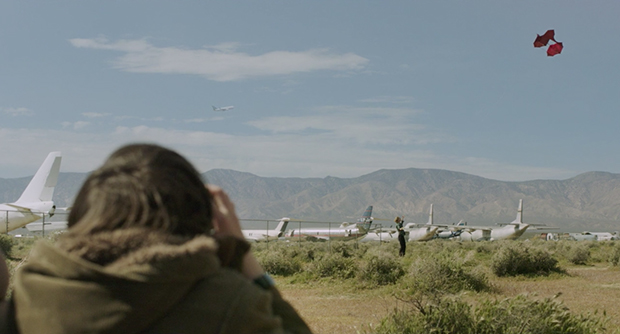 |
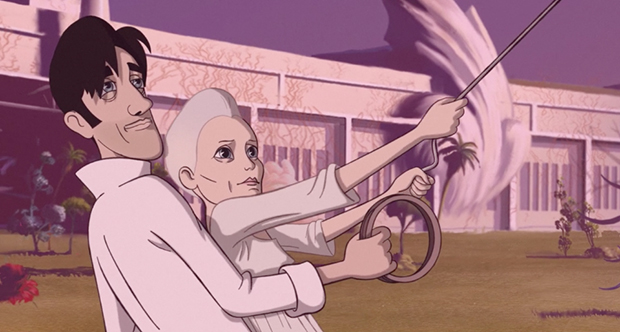 |
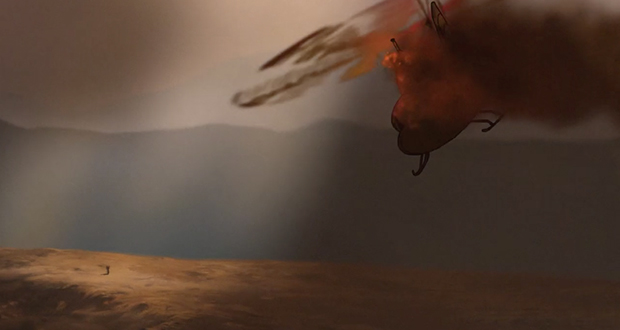 |
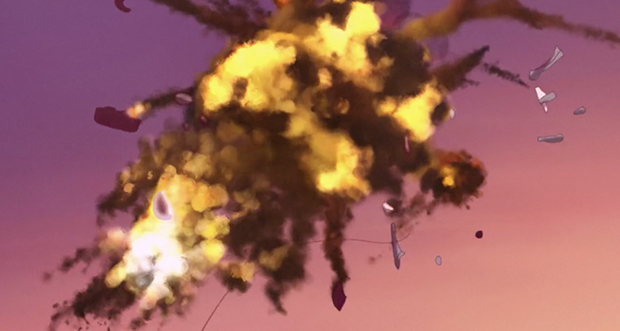 |
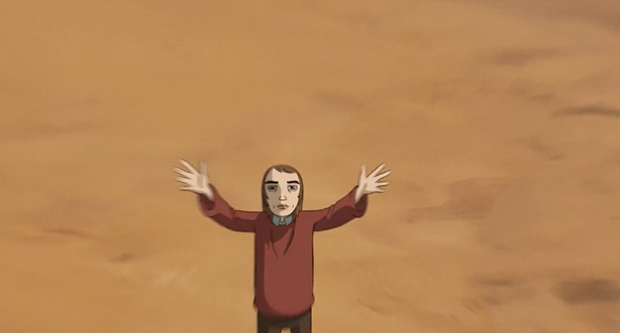 |
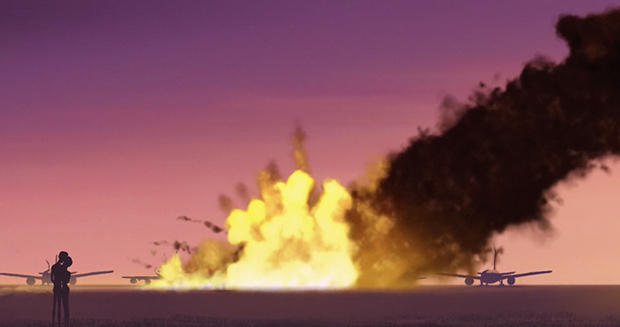 |
One must tussle with who is Dylan that he would be the one to pull this red kite out to fly with Robin, as well as his having the knowlege of who Sarah had become. After all, he is depicted as the animator who gave life to Robin's double for 20 years, a life-time, and who waited for her while she was frozen, feeling a sense of "responsibility".
Next, we see a lobster eat a seahorse, then the character of Michael Jackson grasps the lobster up and places it on a tray that he sets before Robin and Dylan at a restaurant. The lobster looks up at Robin and unfurls from its tail its shell, preparing itself to be eaten. Jackson flames it, slices, and serves it. Because we are about to tumble from heaven into hell, it may be interesting to note that the word "lobster" comes from locust, which reminds of the biblical plagues of locusts. At the Miramount hotel we'd observed cockroaches, which were also ridden by those who came through proclaiming that the chemical flow had been stopped and they were going to be real again. The lobster, unfurling its shell from its tail, even offers itself up to Robin for consumption, as if now she is prepared for what it has to reveal. And we may be reminded of how, in the novel, the "mascon" drug concealed the tails humans had grown due orthographine (correct/right/true + writing/drawing/represent by lines drawn/carving). We should remember that it was Al's account of the boy with the tail, a flaw he exploited, making them both money, that started him in his career, and it was this story he told Robin in order to reach her emotionally, divulging his love for her, and how even he had helped her he had fed upon her, her weaknesses, defects, fears, and now she was trapped in a monster.
Robin asks, what if she doesn't want to take part in the chemical party, and is told, "Then you'll realize very soon that you can't because you won't be part of this world." She'll be on the other side, where truth is, and the ones who didn't pass over and everyone who operates the world she sees here. Dylan says he hasn't been there because he doesn't know if you can get back. It's like coming back from death. Maybe some have, but they'll never know. She entreats him to send her there and she'll tell him what it's like on the other side. Does he have a way to send her there? She learns he has an ampule that can white out all the chemical influences and reveal the truth. It is carried in one of his teeth like the Nazis carried cyanide in case of surrender. He pulls it out for her to see.
Now we need to consider Dylan's last name, Truliner. I've sought and can't find Truliner as a surname, instead it is the name for a denture reline material...which suits Dylan carrying the capsule in his tooth, but it's still a peculiar choice to make for a name. It's to be considered if there's any relationship between the choice of "Truliner" as a name, and orthographine. Why is the ampule concealed in his teeth? Perhaps because of the 21st letter of the alphabet, ShiN, which means "tooth", mystically corresponding with fire such as destroys illusions". Its number is 300, but when all the letters of ShiN are spelled out its number is 360, representing a full circle. With the Tarot, it belongs to the 20th card, that of Judgment, representing when the dead rise from their tombs. It is followed by the World card, the Hebrew letter of which is Tau, truth. Sometimes represented by an androgynous figure, encircled, it can traditionally be thought of as referring to the end of a life cycle, change, a journey, and even flight.
Dylan tells Robin, "This is all I have left. If you take it you're leaving, you're leaving me, you can't do that." Can he come with her? No, The capsule's only strong enough for one person. He tells her it's her choice, and he'll give her anything she wants. He loves her. He has always loved her, first for 20 years when he didn't even know her, and then 20 more years, she was his entire world while he waited every hour of every day for her to come back.
Robin snatches the capsule and ingests it, kissing him. He begs her, "Promise me you't won't look at the real me, promise you'll always remember me this way."
Promising to do as Dylan has asked, Robin leaves, passing Tom Cruise's character seated at a bar, as well as the security officer who had greeted her as she entered Abrahama, who had told her she wouldn't be leaving unless she saw him again. A bartender polishing a glass, he looks up at her. She passes Zeus, Confucius, Christ, Buddha, Magritte's apple man, Frida Kahlo, Pinocchio, Venus, David Bowie, and as she passes them they suddenly transform into vacant people in a dystopian, desperately gray and hopeless world filled with seeming endless streams of like individuals. And Robin, too, is as they are, looking like a homeless street person.
She gasps as she passes a person in an orange suit, a Miramount employee wearing a tank, and certainly also a gas mask. As she moves beyond him we see the hose from the tank he wears extends up to an orange balloon. We might be reminded of the orange gas mask suit that Robin pulled out of the cupboard when at the Miramount hotel, when she was looking for water, before she took a sip from the faucet.
Folman used the orange balloon imagery in Waltz with Bashir as well. He had gone to a therapist friend to ask about his friend Boaz' dream of the dogs, and why would that jog his memory when it has nothing to do with him. The therapist tells him of a psychological experiment in which a group of people were shown 10 childhood images--which Folman depicts in cartoon form as represented by a large helium balloon, a man juggling balls, a man riding a unicycle, a ferris wheel and other images of a carnival. 9 of the images were fake, the person's portrait pasted into a fairground they'd never visited. 80% of the individuals recognized themselves and saw the fake photo as being real. As the therapist continues his story, we see out the windows of his apartment the fairground. He relates that 20% couldn't remember and when they researchers asked them again they did. A boy is shown having a good day with his parents at the park; he carries helium balloon. The therapist says memory is dynamic, alive. If details are missing, memory fills the holes with things that didn't happen. Folman's cartoon character asks, "So my vision of the massacre is like a fake photo?" Did he invent it? The therapist says he doesn't know, and that he should seek out others who were there. Folman states he can check with a man named Carmi who has lived in Holland for 20 years. In the background, we see the therapist's supposed son in the kitchen, now playing with an orange balloon. When Folman says it may be dangerous, that he may discover things he doesn't want to know, the therapist tells him, no, he'll discover important things that he wants to know. "We don't go places where we really don't want to go; a human mechanism prevents us from entering dark places. Memory takes us where we need to go."
Learning that the doctors now live "above" in this hell, Robin takes a train to the same airfield she had visited with Dylan, where they'd flown the kite and the plane had crashed. At the airport we see only white blimps resting in the air. By means of a giant Cody kite, attached to a basket in which she rides, she pulls herself up to one of the blimps.
The hallucinogenic effects are supposed to have been wiped away, Robin seeing the truth--and perhaps she is seeing the truth, but we have to consider the presence of this red kite that has repeatedly occurred in the film. What is it doing here?
As she walks through the blimp, viewing in wonder the various Miramount personnel in official suits, resting in red chairs, enjoying such things as cigars and whiskey, we may be reminded of Space Station 5 in 2001 and its red djinn chairs. She asks a man who is looking through a telescope where Dr. Barker is and is directed to the end of the corridor.
She enters Dr. Barker's office and they embrace. She says she knew he wouldn't cross over and he tells her that being on this side of the truth is not so brave. Nothing has really changed, he tells her. "Once, we just masked the truth with antidepressants, drugs that concealed, lied. Now we reinvent the truth...the drugs have just gotten much better." When she asks if there is no other choice, he says the difference is waiting to die in "this filth of truth", or hallucinating "over there". He wonders if it's better over there, dreaming. When she inquires about Aaron, he tells her that he'd waited for her to come back, then finally exactly six months before, almost totally blind, he crossed over, having given up on her return. "He's somewhere else in the world of chemical fantasy on the other side." And there's no way of finding him. "Here, he doesn't exist." On the other side there's no way of finding who he is. But she can go back and that's better than waiting for death. Robin wonders, "Can I go back to where I came from?" There is no such place, he tells her. "You invented it." She'll go where her mind and chemistry will take her, and after her experience there, a different place in her consciousness, her past is dead.
He fixes her an ampule and says he'll "call the kite". As he hands her the ampule, he asks if she knows where she's going. She replies, yes, she knows.
We hear a heartbeat and see a light through as if red illuminated tissue and veins. The womb. If we return to her passing by the bartender, he is standing beside much the same image we see of the tissue of the womb, and a dolphin woman seated before it, looking over at Robin. Dolphin comes the Greek word delphis, related to delphys, womb.
It could be argued it reminds of HAL's red eye with its orange center.
Back in the animated world, we have Aaron's POV as he is born and handed to Robin, who stretches out her arms for him, to nurse him.
That we have returned to Aaron's childhood reminds of the cartoon Grace Jones figure telling Robin, after coming out of deep freeze, "It's like bringing a diver back from the bends. You have to start as far away as possible with the things you know from childhood."
A bright white light is revealed to be on a movie soundstage where Aaron, a toddler, views himself in a monitor as he watches his mother acting, kissing an individual, before a sunset.
He is reflected in water on the beach, flying a kite that breaks away and soars away in the sky.
He's reflected in the window in Dr. Barker's office during the hearing test--and there is a difference from what we originally viewed. He is reversed in comparison to when he was in the doctor's office in the first part. This is notable, and we will have another example as well of a reversal.
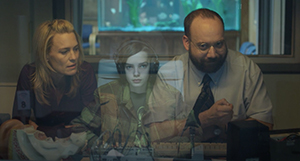 |
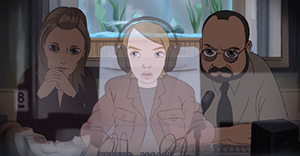 |
He watches as Sarah leaves home.
He watches his mother leave for Abrahama and the Futurological Congress, and slips on his sunglasses, looking at himself in a mirror.
He sees the moment in the convention when she announced he was her son and his image appeared on the screens, apparently viewing from opposite the stage--but not in the area of the shooter, who was positioned more above.
Dr. Barker is observed directing him to where he can see Robin in her frozen state. Dr. Barker greets him with a doctor who was also observed standing beside Robin's bed (the image showing her feet as she lies in bed), who was the one who revealed she would be frozen. Dylan had said he was the last to see Robin, though we had been shown the cinematographer lowering her into the liquid nitrogen. However, from Aaron's perspective, he appears to have been the last to have seen her. He stands outside her chamber, looking over her, and we are reminded of Robin seeing him across the frozen waste, calling to him, and holding onto him.
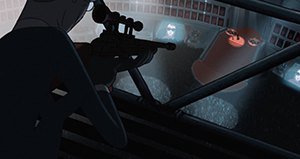 |
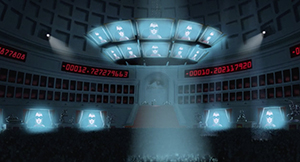 |
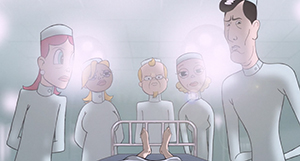 |
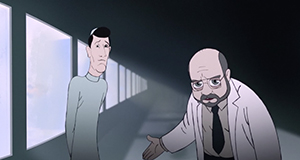 |
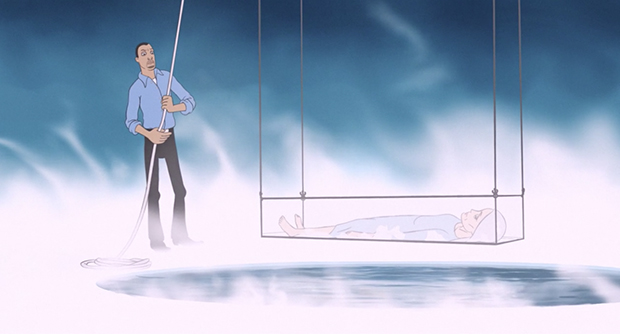 |
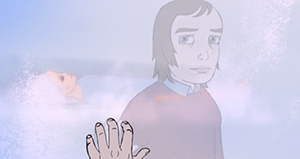 |
We see his POV as he takes the same ride up to the blimp as had Robin. He passes through the blimp and opens the office to Dr. Barker's, seeing himself in the mirror there. A difference between what we observed when Robin visited Barker and Aaron does, is that Dr. Barker's name is on his door, and Robin opens the door to the right, whereas we see Aaron opens the door to the left and there is no name. Also, a mirror is opposite Aaron as he enters Barker's office, whereas there was no mirror when Robin entered, there was instead a screen before a bed.
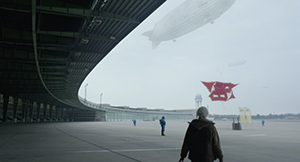 |
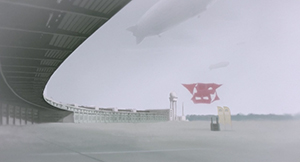 |
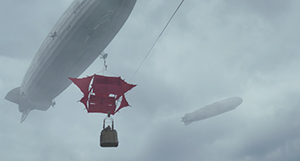 |
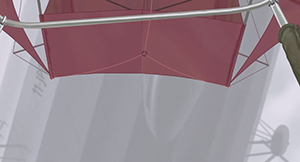 |
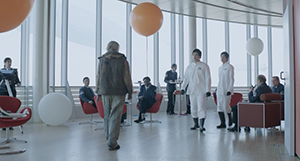 |
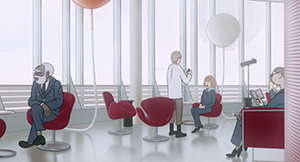 |
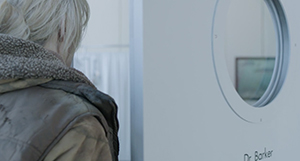 |
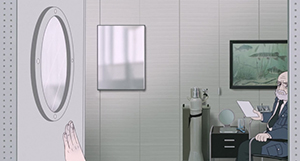 |
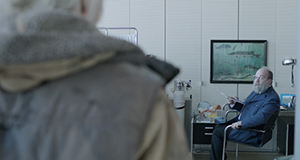 |
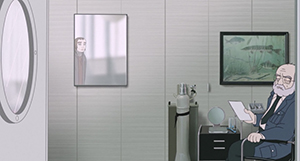 |
He takes his ampule.
We hear the heartbeat again. He's walking down a path in a field toward where rests an Airstream trailer and we see a man with a Wright glider. We hear Robin's voice calling, "Aaron", but it is Aaron's reflection we see in the Airstream trailer. This is to be compared with, at the film's beginning, when Robin ran out to Aaron as he flew his kite beside the airfield, she calling out to him and he not hearing her. Now, though we hear Robin, rather than seeing her reflection in the Airstream, we see Aaron's.
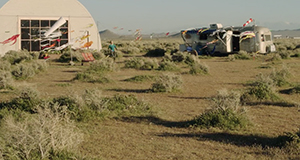 |
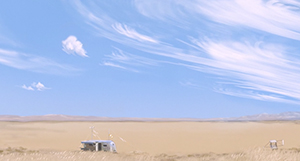 |
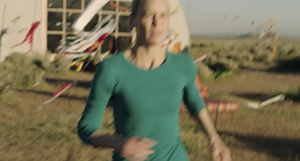 |
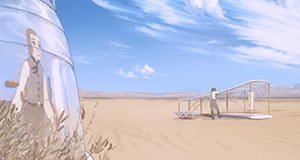 |
The man beside the glider turns toward Robin's voice, having heard her. It's Aaron. But we knew it would be. He smiles.
The heartbeat stops.
In the book, The Futurological Congress, the main character comes out of his hallucinatory state at the end to find that it is still the second day of the congress. That isn't what happens here. Via Robin's experiencing "Usher Syndrome" (in quotes because I think the movie uses the idea of Usher Syndrome as a metaphor for something else) it seems to be suggested that with this rebirth she was able to perhaps find Aaron by coming back as him. Folman has appeared to specifically state the very last scene was a tribute to 2001 and so I would imagine it's his conception of Bowman's rebirth through the monolith wherein the infant is paired with the blue and white-clouded marble of earth, and notice that the colors in this end scene other than blue and white and muted earth tones. We should also be reminded of how Bowman, in the "hotel room", several times saw himself and seemingly simultaneously made leaps forward in time until he was ancient, lying on his bed, and saw the monolith, he thereupon transformed into the universal child and passing through the monolith which acts as a door, the mid-point of symmetry, as "Thus Spake Zarathustra" played. Where Aaron and Robin reunite is the place of Aaron's original Wright brother who builds in the age of jets and space ships, and has not so much to do with personalities than spiritual evolution, though as the audience we feel personalities in the joy of the reunion of Robin and Aaron. When Robin said that she was going unrecognized, Aaron stated that he had been unrecognized for thirty years, and thereafter she has no personal communication with him until the film's end. It's difficult to impossible to organize the film so to be confident with an interpretation, because the movie is very loose, its rules changing, and I don't know if this is purposeful or because of Folman himself being undecided. As the literal Usher Syndrome seems not to perfectly describe Aaron's situation, perhaps we should look at its etymology and consider usher comes from one meaning, door, and thus a doorkeeper, having to do with transitions and birth. Folman has Usher syndrome as a releasing from the bounds of earth with the ability to glide above it, which seems disconnected from transitions and birth, but it is during Robin's experience of "Usher Syndrome" that she comes upon the place where she's told Sarah is one of the few who still brings children into the world. Aaron's "Usher's Syndrome" seems less to have alienated him from Robin than Robin from him. Before she is reborn as him, she is first reborn as herself, taken through the things of her childhood, then having been shown the joys and pleasures of the hallucinogenic paradise, she still seeks the missing. That Aaron passed over "exactly" six months before her return, puts the two in the relationship of Christ and John the Baptist, the summer solstice and winter equinox, the birth and death of the sun, one rising as the other falls, one strengthening as the other weakens. After Robin's experience of Aaron's life they reunite harmoniously. And though Al's relationship with Robin had strengthened as Aaron weakened, it is Al who gives Aaron the gift of the representation of the glider that ultimately partners with this reunion.
Ultimately, what all this means for Folman, I don't know, I can't say. What I wanted to do was look at how he used references to Kubrick's films, how he connected them with his version of The Congress, and it is interesting. What is confounding to me is how there are no interviews with Folman on Youtube that deal with The Congress. He'd likely be reluctant to discuss in depth his personal interpretation of the work, but even some generalities would be good, and certainly anything he might have to say on different ideas of Kubrick's that he shares, and what his references to Kubrick meant for him and the film.
July 2021. Approx 14,500 words or 29 single-spaced pages. A 111 minute read at 130 wpm.
Return to the top of the page.